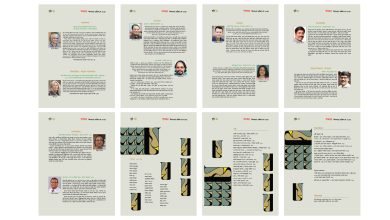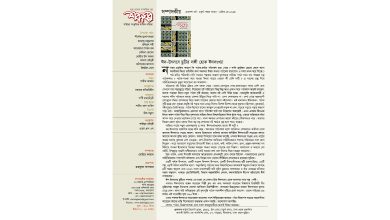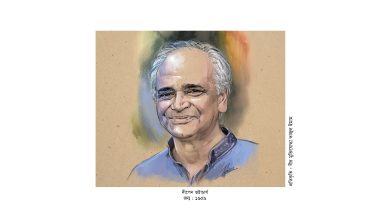Aporajita : Ahmad Mostafa Kamal
Story
Translated from the Bengali into English by Alamgir Mohammad
‘The river that you see here had been a witness too to countless incidents. Numerous corpses floated away through this river during the Liberation War!’ Anik thought, it was once a canal then. It is difficult for a newcomer in the village to realize this. Not that deep, it is almost filled; its width is far extended, like the small rivers, though there is no water here anymore. Maybe there has been no water for long and thus a path has been created for people’s movement. He said this too…
If you did not make it clear, I would not know once there was a canal here. People have made it a road for their movement!
Yes, right you are. No one can understand this without a clue. It has got filled with silt. But, once it was deep and there had been water all through the year. During rains, water used to overflow the fields. Water water everywhere, rain in full swing.
Anik was getting amazed at his words. Certainly, he reads a lot, maybe poetry too. Otherwise, he won’t be able to use such chosen dictions. Of course, he has been fascinated with everything in the village. He has come here for two days but doesn’t want to get back even after four days. He doesn’t feel any urge to go back for he has not seen such a beautiful village before. And, this woman who is his grandmother-in-law, although of distant relations, tells stories so elegantly that he likes to keep listening to her.
The river too has dried up – she continued – whereas it’s a canal! Moreover, for sustenance canals need to be dredged up every two to four years. Otherwise, they get filled with silt. It is a village by the bank of the river. You understand it. Two rivers; Padma is a bit away, and from there Ichamati has run through villages. The source of the canal water was that river. During rains rainwater used to flood through Ichamati, from Ichamati to these canals, and then overflowed to the cropland. Even after the rains water was there in the canals for it was deep indeed. The canals have not been dredged up for years! People do not have spirits anymore; no endeavours and even they do not feel the need.
Why no need? Does the need for water ever end?
No, it doesn’t. But, if there is any alternative, who wants to take the hurdles? In the past, people used to dredge on their own for the sake of preserving water. During the rains the canals fill up to the brim and after the season ends water is locked up with dames. That water was used for the needs all through the year. People were much more caring about the canals then. One could find canals in this village and other villages – every half a mile.
He has seen them already. He has come here to see villages. Anik grew up in an urban environment, used to go to his grandparents’ home on occasionally during childhood, but they were simply outings – he couldn’t form any relations. In the meantime a gap developed as he had been overseas for long. After coming here he comes to know – his parents and uncles have sold all their land. No one stays there. Who will take the hassle of taking care of those? Their dwelling place still exists but no one goes there for a long time. Probably their dwelling place is no longer habitable now. For these reasons, Anik couldn’t go to his grandparents’ place. The intoxicated air of Dhaka has made his life terrible. After coming back to Bangladesh he married and is now feeling exhausted with after-marriage invitations, parties, and rituals. Things are the same with his father-in-law. They have an address in the village but no one lives there for a long period. Things are not up to the mark there to entertain a new husband. For some say, he has expressed his wish to his wife that he wants to go to a village. A village in the real sense of the term, not going to Dhaka for Sylhet or Chittagong leaving Dhaka. So, after thinking for some days, Muna said, ‘We can go to Udaspur.’
The name Udaspur sounds beautiful. Who stays there?
My grand-father and grand-mother live there. They are my father’s maternal uncle and aunt. They are very amicable souls; they do not want to come to Dhaka. We often visit them.
Anik accepts the proposal delightfully. A new groom is going, is it possible without informing? A letter is sent to the grandma there. She gets her reply of her shortly. Then they have come here. They are feeling very well after coming here. It’s an amazingly beautiful village. The trap of urban civilization is yet to destroy its simplicity. No pitched roads, one should only walk – no touch of electricity, no mobile phone, no television, no industrial noise; as soon as the evening falls people light up their lanterns and kerosene operated hurricanes, incessant cricketing, roaming of the lightening bugs in the forests, the long-extending call of the night birds, the sound of dew drops on the tin roof—as if they were coming up on the pages of novels. The whole thing seemed fascinating and thrilling to Anik. He has come here for two days but it has been four days and Anik has offered his desire to the grandma for staying some more days.
The grandma became surprised and asked, ‘What’s there to ask? Stay as long as you find it okay here.’
I wish to stay here for life.
You can do it too. I will get a company here.
Grandpa will feel jealous then!
Let him be! It is better to be a bit jealous in old age.
Grandma is much jolly and she loves to talk. But, grandpa seems to be not much. He is a bit tired of old age. Grandma too is old. Probably she has reached seventy. But, she doesn’t seem that much older as her words and movements suggest. Of course, it can be understood that she had been a beauty at her age. Sharing pleasantries with grandma, her delicious cooking, chatting with her, and outing with his wife village after village — Anik has been very jolly with all these. After ages, he is passing anxiety-free life. Muna chats with the grandpa all day. It can be understood both have a good rapport.
While roaming around Anik has framed a picture of the old days. A very large village, the ever-young Padma is some miles away from it; a branch of it has run towards the north in a winding way, and people claim it as Ichamoti. It is a dying river; Anik suspects it at first sight as a river, but the grandparents and other seniors of the locality told him it was a naturally flowing river and once had not been that much narrow as it is today. Rivers are naturally born, while canals are dug. Anik did not know this fact. There are two different villages on the two banks of Ichamoti. As the river is flowing towards the South from the North the two villages are called East Udaspur and West Udaspur. He is in East Udaspur now. The fact is Ichamoti is on the west of the river, and there is another village on the other side. There are a great number of houses on this bank, a large-scale paddy field and there is a road after it that connects the local Ganj. There are some houses on the other side of the road. This field is the divider between the villages. There are no houses and what is seen is the far widened paddy field. The canals were dug from the west front of Ichamoti and were directed towards the west. It stops exactly beside the main road. Though there is no water now, once it was a source of water once for the villagers. Anik listened to these anecdotes from grandma sitting beside a clog on the bank of the river. She said:
Now the shallow engine has been invented, tube wells are set; people use water drawn from the deep. Nowadays, people do not rely on canals for water. Moreover, the river Ichamoti has lost its life by now. There is a dam at its source and some places are already filled.
Alas! Do people grab rivers here? Has the journey of Housing Society already started?
Not so. This dam was set for tackling erosion of the Padma. Now, there are neither any rivers, nor canals. Like most other things the signs of these have been removed. But, can anyone efface the mark set on minds?
No, it cannot be.
But, I think most people have forgotten this memory.
No, not so. Those who fought in the 1971 Liberation War have not forgotten them. But, I can tell you one thing; the canals and rivers dry up, if they are not dug; going back to memories is important for reliving the mind.
Hm. That you said about unidentified corpses that floated away through this river…
Yes. They were. Though I didn’t see them. I did not belong to this village. I came here as a bride two years after the War of Liberation. I heard them from your grandpa. In 1971 there had been a long rainy season in Bangladesh. And, rains in this locality is ‘water everywhere’. Fields and banks of rivers went underwater. It was very difficult to move on feet and the question of running any vehicle was out of fancy. The Pakistanis used to use launches for moving in the villages with the help of collaborators. They used to torch the houses of people indiscriminately and kill people massively. Young girls were taken captive while the Freedom Fighters were tortured brutally in the camps. Those who died of inhuman torture corpses used to be thrown in the rivers and canals. There had been no other alternative except throwing corpses into the canal water as all the graves went underwater. Who would bury so many corpses and how?
Anik was moved after listening to these horror descriptions. He could not figure out the whole thing even after imagining it. He realized, even the imagination of human beings has a limit.
Anik stood motionless for a while. The weather was heavy and Anik could not even utter a single word. He even didn’t dare listen to the whole in detail. The grandma herself started again– This river did not only witness the floating corpse but it witnessed many other things.
Like? Suppose, one of the wives of the village could get the time she used to cry alone standing here on the bank of the river. She witnessed her crying. Perhaps, much of the tears of the village wife went mixed with the sweet water of the river.
Why did she cry or she used to cry for failing to go to her parents?
No. For she won’t be able to go to her parents anymore? Why? Why?
Did she elope with her lover?
Nah! Her parents did not want to keep her. They had no way to do it. The girl too wanted to flee to live, her parents too wanted it.
What are you saying? How could parents want this?
Usually, no parents can. But time was difficult then.
Please break your mystery. Is it possible? The Pakistani Army held the girl captive in their refugee camp. She was taken in June 1971. And, then for the next six months…
Oh!
Anik became stunned again. It is very disheartening to listen to such a horrific story. It hurts a lot. Although to the listeners they are stories and to the speakers they are life, yet they hurt. That this matter would take this turn, he would not think as such. At the outset he thought, Grandma was telling all these to light up her mind. For this mockingly he poked her asking about elopement and love. But, he finds the tale otherwise. After keeping silent for a long while Anik again asked, then…?
The Freedom Fighters rescued this girl from one of the rejected camps of the Pakistanis. Not only she but there were also other girls too. Those who were yet to lose memory could identify their locations had been sent to their house. The other women were taken to the Shelter by the Freedom Fighters. The aforesaid girl too was sent to her family by one of the Freedom Fighters. People from her village came in hordes to see her. No one thought she escaped death. Even her parents too thought she had died before. The girl, who has returned after so many days, is not their daughter! This state of living is not living in the truest sense of the term. Is it possible to keep alive with a taunted body and tortured mind? But, how many of us care for the mind? The villagers started opening their minds. A girl, a raped girl who lost her chastity, a girl who lost interest in life, what can be done with her? Where to keep her? Thus, they didn’t want to keep her in the village. The parents of this girl were forced either to get her married off or to cast her out. The parents and her relatives faced danger for her. Is it so easy to get her married? Who will marry a girl like her who lost everything? People were up and doing to see her trodden. They forced her parents to get her killed by drinking poison if they would fail to get her married.
Shit! Anik cried out. Shit! Shit! Are they humans? Were all the villagers collaborators?
No, they were not. But, it was the reality. These war heroines became untouchable in society.
Why did it happen? It was never expected thus. These girls did not do any wrong.
Do you know what I feel? A man has two minds. One is personal and another is social. The social one sometimes supersedes the former one. Men accept many things that are not accepted in personal morality. And it happened with the girls who lost their chastity. Certainly, many people had sympathy for them but their minds were lost to the social ones.
I have understood it. But, did none protest against this attitude? Where were the Freedom Fighters? Didn’t they protest?
Time was out of joint then. The Freedom Fighters were aimless. Many went to underground politics, some were busy in rifts among them and most of them were more or less tensed about their future.
What happened then? What could one’s parents do in such an awful situation? They were ordinary people and had no power to tackle society. They could very much likely expect their daughter to live somehow even by fleeing.
No. They cannot. Did she flee?
This time the maternal uncle and aunt of this girl came as saviors. After visiting her and getting informed about all the occurrences they decided to take her on their own. They fixed a condition that her parents won’t be able to claim her back as their daughter anymore. The presents agreed without any words. The girl too accepted it. They took her to the town first and after taking care of her they took her to their home. They didn’t have any children. So, they nurtured her to their best. Even they changed her name.
Why did they change her name?
They did not want to keep her previous identity lest the villagers could anyway come to know about her past.
Oh! With that new name did she have a new life?
Yes. Not only her name but also her father’s name was changed.
Father’s name? What a wonder! In place of their father’s name was the name of her uncle written?
Nah! The name of the Father was written!
What?
After he became free from detainment in Pakistan, he came back to the motherland and found it had been destroyed and massacred all around by the Pakistani Army. Destruction everywhere. He was not only a leader of the people but a father in the truest sense. He felt empathetic towards these girls with a father’s mind. He announced, ‘All the raped girls in the War of Liberation are my daughters. In place of father’s name let my name be written and their address in Dhanmondi 32!’ Did he tell these things with less sadness? There was a brewing disaster going on across the country then and people did not want to accommodate these girls. And, how could they keep them in? Some are pregnant, some have given birth to babies, some have gone mad and others were severely affected by various diseases. They could get no medicine, no remedy. What they got were only insults, disrespect, and social pressure. Only the father of the nation could realize the pains of these afflicted girls whose life was almost going to be proved a disaster. He recognized them as his daughters and approved their address Dhandmondi 32!
How strange! Anik was thinking. A girl changed her name – It is done by many, even by whim, without any logical explanation. But, in place of her father’s name, she had written ‘Sheikh Mujibur Rahman’—this usually doesn’t happen. Is it possible too?
What happened then, Dadi?
After long the Freedom Fighter came to their home. He looked for the girl but found she eloped. No villagers know anything. And, the parents did not want to inform anything.
Why?
The girl has started a new life. She did not expect the presence of anyone from her past.
Then?
He then went to the girl’s father. He said, ‘I want to marry her. Tell me where she is.’
Hearing the proposal of marrying his daughter he could not resist himself anymore. He told him everything in detail and gave him her new address. The next day he appeared at her uncle’s home. The uncle did not want to acknowledge that there was a girl in his home. For, he was looking for her with her past name; a name which was repelled after coming here. He was not a man to leave things so easily. He cleared it to the uncle that knowing everything in detail he has come to marry her if she would accept it.
This time Uncle too became a bit soft. Their marriage was arranged. Her parents came to the occasion yet her name was written Aporajiita Rahman daughter of Sheikh Mujibur Rahman, Address: Dhanmondi 32, Dhaka.
Anik has realized everything by this time. Whisperingly he said, ‘Grandma, your name was a good take. You are an amazing beauty as the little flower grieved with blue. Dadi was not surprised at all. She said, ‘I knew you would understand everything. You are an intelligent boy. Do you know, I did not tell it to anybody; even Muna doesn’t know it. Not even her father.
Why didn’t you tell anyone? You have sacrificed greatly for our country. You are our pride!
Do not speak in the language of books, Bhai. What bad situation we had undergone only we know the impact. Lacs of women lost their chastity in the War of Liberation. How many of them do you know by name? Pride? If they were your pride, won’t you keep their names recorded?
Dadi has no anger in her voice. Only a long deep sigh pains. Without uttering a single word Anik lies down beside her on the ground and takes her legs in his hands.
Anik doesn’t leave. Rather he kisses her feet. He was full of tears then, same with Aporajiita Rahman.
Ahmad Mostafa Kamal : Fictionist in Bangla Literature
Alamgir Mohammad : The Translator teaches at the department of English, Bangladesh Army International University of Science and Technology, Cumilla.
Illustration : Satabdi Zahid




